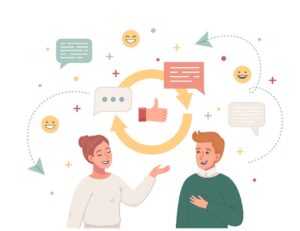
In a world where communication reigns supreme, mastering effective communication skills is an indispensable asset that can significantly enhance your personal and professional life. Whether you’re navigating complex business negotiations, nurturing relationships, or simply engaging in everyday conversations, the power of effective communication cannot be underestimated. Communication plays a vital role in personal and professional sphere, and here is with comprehensive insights and invaluable tips to help you become a master communicator.
The Art of Active Listening
Active listening is the cornerstone of effective communication. It involves not just hearing the words spoken but truly understanding the emotions, concerns, and intentions behind them. When engaged in a conversation, devote your full attention to the speaker. Maintain eye contact, nod in agreement, and show genuine interest in what they’re saying. By doing so, you not only foster a deeper connection but also gain insights that can guide your responses.
Clarity and Conciseness
Clarity and conciseness go hand in hand when it comes to effective communication. Crafting your messages with precision eliminates misunderstandings and ensures your point is conveyed accurately. Avoid using jargon or convoluted language that may confuse your audience. Instead, opt for clear and straightforward words that resonate with your listeners.
Non-Verbal Communication
It’s often said that actions speak louder than words, and this couldn’t be truer in the realm of communication. Non-verbal cues, such as facial expressions, gestures, and body language, can convey emotions and attitudes that words might not capture. Maintaining an open posture, offering a firm handshake, and smiling warmly can instantly create a positive impression and establish rapport.
Empathy and Understanding
Empathy forms the bedrock of effective communication. Putting yourself in someone else’s shoes allows you to understand their perspective, feelings, and needs. When engaged in a conversation, show empathy by acknowledging the other person’s emotions and validating their experiences. This not only builds trust but also encourages open and honest dialogue.
Constructive Feedback
Providing and receiving feedback is an essential aspect of communication, especially in professional settings. When offering feedback, focus on the specific behavior or outcome rather than making it personal. Constructive feedback should be actionable, highlighting areas for improvement while recognizing strengths. On the receiving end, approach feedback with an open mind, viewing it as an opportunity for growth.
Adaptability in Communication Styles
Effective communicators are versatile and adapt their communication style to suit different situations and audiences. Whether you’re addressing colleagues, clients, or friends, tailor your language, tone, and content to resonate with your listeners. This adaptability enhances understanding and engagement, ensuring your message is received positively.
Conflict Resolution
Conflict is inevitable in any human interaction, but how it’s managed can make or break relationships. Master communicators approach conflicts with patience, active listening, and a focus on finding common ground. By addressing concerns calmly and seeking solutions collaboratively, you can transform conflicts into opportunities for growth and strengthened relationships.
Storytelling as a Communication Tool
Storytelling transcends cultures and generations, making it a powerful tool for effective communication. Weaving relevant anecdotes and narratives into your conversations can capture your audience’s attention and make complex concepts more relatable. A well-told story has the ability to evoke emotions, drive home key messages, and create a lasting impact.
Digital Communication Etiquette
In today’s digital age, mastering effective communication extends to the virtual realm. When communicating through emails, texts, or social media, practice proper etiquette. Use clear subject lines, maintain a professional tone, and avoid misinterpretation by choosing your words carefully. Emojis and exclamation points can add warmth, but use them judiciously to maintain professionalism.
Continuous Learning and Improvement
Effective communication is a skill that can always be refined and improved. Keep learning by seeking feedback, attending communication workshops, and studying successful communicators. Stay updated on communication trends and technologies to remain relevant in an ever-evolving landscape.
In conclusion, mastering effective communication is a journey that requires dedication, self-awareness, and a genuine desire to connect with others. By honing your active listening skills, fostering empathy, adapting to different communication styles, and embracing continuous learning, you can become a master communicator who navigates conversations with finesse and creates meaningful connections.